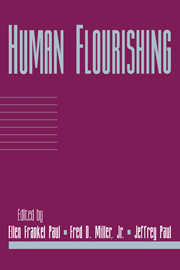Book contents
- Frontmatter
- Contents
- Introduction
- Acknowledgments
- Contributors
- Human Flourishing and the Appeal to Human Nature
- The Three Faces of Flourishing
- Flourishing Egoism
- The Idea of a Life Plan
- Human Flourishing Versus Desire Satisfaction
- Happiness and Human Flourishing in Kant's Ethics
- Valuing Activity
- Ancient Perfectionism and Its Modern Critics
- Aristotle's Elusive Summum Bonum
- Eudaimonism, Love and Friendship, and Political Community
- No Families, No Freedom: Human Flourishing in a Free Society
- Politics, Neutrality, and the Good
- Human Flourishing and Universal Justice
- Index
Politics, Neutrality, and the Good
Published online by Cambridge University Press: 05 October 2013
- Frontmatter
- Contents
- Introduction
- Acknowledgments
- Contributors
- Human Flourishing and the Appeal to Human Nature
- The Three Faces of Flourishing
- Flourishing Egoism
- The Idea of a Life Plan
- Human Flourishing Versus Desire Satisfaction
- Happiness and Human Flourishing in Kant's Ethics
- Valuing Activity
- Ancient Perfectionism and Its Modern Critics
- Aristotle's Elusive Summum Bonum
- Eudaimonism, Love and Friendship, and Political Community
- No Families, No Freedom: Human Flourishing in a Free Society
- Politics, Neutrality, and the Good
- Human Flourishing and Universal Justice
- Index
Summary
THE NEUTRALITY OF THE STATE
A large number of prominent philosophers have in recent years advocated the thesis that the modern nation-state should adopt a stance of neutrality toward questions about the nature of the human good. The government, according to this way of thinking, has two proper goals, neither of which require it to make assumptions about what the constituents of a flourishing life are. First, the state must protect people against the invasion of their rights and uphold those principles of justice without which there can be no stable and lasting social order. This goal is accomplished through a guarantee of basic civil liberties and the enforcement of a criminal code that prohibits murder, theft, fraud, and other widely recognized harms. Second, the state should promote the general welfare of the citizens by providing them with or helping them acquire the resources they need in order to lead lives of their own choosing. There are certain all-purpose means that people need in order to accomplish their goals—money, health, opportunities for employment—and it is legitimate for the state to pursue policies that enable citizens to acquire these goods. It may build roads, raise an army, regulate the economy, insure standards of safety, and supervise any other projects that give people the basic wherewithal they need to pursue their own ends.
- Type
- Chapter
- Information
- Human Flourishing , pp. 315 - 332Publisher: Cambridge University PressPrint publication year: 1999
- 15
- Cited by

